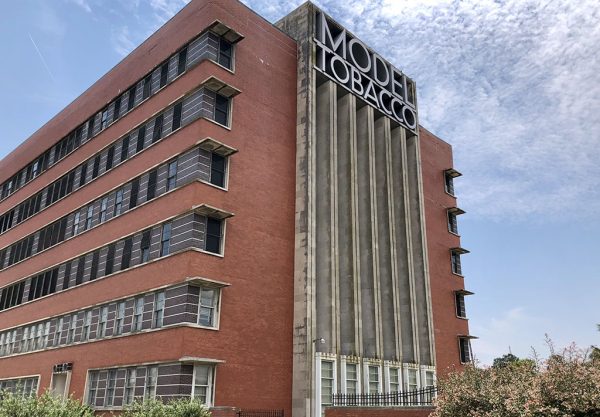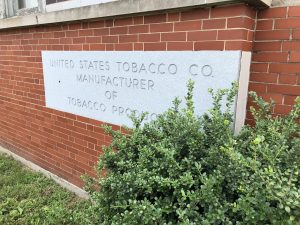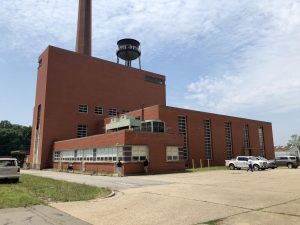A Maryland-based developer is weeks away from closing on a purchase and beginning his planned resurrection of a long-dormant tobacco factory on the city’s Southside.
Chris Harrison, principal of C.A. Harrison Cos., said he plans to finalize a deal for the 15-acre Model Tobacco Co. complex at 1000 and 1100 Jefferson Davis Highway by the end of the month.
He said he plans to bring a mix of 275 apartment units, the bulk of which will be income-based.
In addition to renovating much of the site’s main Art Deco-style building into apartments, Harrison said the project also would include a 47,000-square-foot entertainment venue that would house a beer garden and space for a restaurant.
Harrison, who has not filed a development plan with the city, said construction is slated to begin toward the end of the second quarter, and will take about 18 months to complete. Richmond-based Walter Parks Architects is designing the project. A general contractor was not disclosed.
Harrison placed the sprawling property under contract in August 2017. Brokers Ryan Rilee and Tom Rosman of One South Commercial are representing the sellers, Charles and Eileen Keck, who have owned it since 1989.
He has hired Lory Markham, owner of local land-use consulting firm Markham Planning and One South Commercial agent, to lease the entertainment venue. She also helped the development firm to rezone the property last summer.
Harrison would not disclose the purchase price or cost estimate for the redevelopment project.
The property most recently was assessed for about $5.5 million, according to city real estate records.
The Model Tobacco complex is comprised of seven buildings, most notably the Art Deco, six-story, 222,000-square-foot building fronting Jefferson Davis Highway that dates to 1940.
The site was one of 13 historic properties that the state’s Department of Historic Resources added to the Virginia Landmarks Register last month. The state division plans to forward that list of properties to the National Park Service for nomination to the National Register of Historic Places.
Designating a property to the state or national registers allows the owner to pursue historic rehab tax credits when restoring the building.
A history of development
Harrison’s company has completed mixed-use and multifamily developments throughout Washington, D.C., North Carolina and Virginia — primarily throughout metro Richmond.
The firm developed The Argon apartments on Cutshaw Avenue in the West End and the 2001 East apartments on East Broad Street in Union Hill.
Farther south in Petersburg, the company is preparing to begin work next quarter on a $20 million, mixed-use project on the site of the former Ramada Inn at 380 E. Washington St., along with parcels of land at 326 and 400 E. Washington St. The city purchased the site for $750,000 last spring.
The Model Tobacco facility has been eyed for mixed-use redevelopment for decades — part of the city’s plan to jump-start investment along the struggling Jefferson Davis corridor.
The Kecks have fielded ideas from developers through the years, including one proposal in 2012 to convert the site into 600 apartments and include a mix of commercial uses.
Last summer, Richmond City Council members approved rezoning the site to B-6 mixed-use under certain provisions that included prohibiting demolition of the Art Deco building and the complex’s former power plant facility. Harrison must also preserve the “Model Tobacco” signage on both ends of the six-story building.
Aside from rezoning the main Model Tobacco campus, council members also granted Harrison’s request to rezone a collection of adjacent industrial parcels at 210 and 212 Brinser St.; 101,103,105,115 and 117 Thurman St.; and 2400 Elton St. to mixed-use. Harrison purchased the lots in May 2018 for a combined $190,000, according to city property records.
A revival of the Model Tobacco property would add to increased development interest along Jefferson Davis.
Less than a block away, the former American Tobacco Co. complex at 800 Jefferson Davis Highway, – now dubbed Port City – is beginning to lease out 134 apartments in its first phase of an expected 292 total units.
A Maryland-based developer is weeks away from closing on a purchase and beginning his planned resurrection of a long-dormant tobacco factory on the city’s Southside.
Chris Harrison, principal of C.A. Harrison Cos., said he plans to finalize a deal for the 15-acre Model Tobacco Co. complex at 1000 and 1100 Jefferson Davis Highway by the end of the month.
He said he plans to bring a mix of 275 apartment units, the bulk of which will be income-based.
In addition to renovating much of the site’s main Art Deco-style building into apartments, Harrison said the project also would include a 47,000-square-foot entertainment venue that would house a beer garden and space for a restaurant.
Harrison, who has not filed a development plan with the city, said construction is slated to begin toward the end of the second quarter, and will take about 18 months to complete. Richmond-based Walter Parks Architects is designing the project. A general contractor was not disclosed.
Harrison placed the sprawling property under contract in August 2017. Brokers Ryan Rilee and Tom Rosman of One South Commercial are representing the sellers, Charles and Eileen Keck, who have owned it since 1989.
He has hired Lory Markham, owner of local land-use consulting firm Markham Planning and One South Commercial agent, to lease the entertainment venue. She also helped the development firm to rezone the property last summer.
Harrison would not disclose the purchase price or cost estimate for the redevelopment project.
The property most recently was assessed for about $5.5 million, according to city real estate records.
The Model Tobacco complex is comprised of seven buildings, most notably the Art Deco, six-story, 222,000-square-foot building fronting Jefferson Davis Highway that dates to 1940.
The site was one of 13 historic properties that the state’s Department of Historic Resources added to the Virginia Landmarks Register last month. The state division plans to forward that list of properties to the National Park Service for nomination to the National Register of Historic Places.
Designating a property to the state or national registers allows the owner to pursue historic rehab tax credits when restoring the building.
A history of development
Harrison’s company has completed mixed-use and multifamily developments throughout Washington, D.C., North Carolina and Virginia — primarily throughout metro Richmond.
The firm developed The Argon apartments on Cutshaw Avenue in the West End and the 2001 East apartments on East Broad Street in Union Hill.
Farther south in Petersburg, the company is preparing to begin work next quarter on a $20 million, mixed-use project on the site of the former Ramada Inn at 380 E. Washington St., along with parcels of land at 326 and 400 E. Washington St. The city purchased the site for $750,000 last spring.
The Model Tobacco facility has been eyed for mixed-use redevelopment for decades — part of the city’s plan to jump-start investment along the struggling Jefferson Davis corridor.
The Kecks have fielded ideas from developers through the years, including one proposal in 2012 to convert the site into 600 apartments and include a mix of commercial uses.
Last summer, Richmond City Council members approved rezoning the site to B-6 mixed-use under certain provisions that included prohibiting demolition of the Art Deco building and the complex’s former power plant facility. Harrison must also preserve the “Model Tobacco” signage on both ends of the six-story building.
Aside from rezoning the main Model Tobacco campus, council members also granted Harrison’s request to rezone a collection of adjacent industrial parcels at 210 and 212 Brinser St.; 101,103,105,115 and 117 Thurman St.; and 2400 Elton St. to mixed-use. Harrison purchased the lots in May 2018 for a combined $190,000, according to city property records.
A revival of the Model Tobacco property would add to increased development interest along Jefferson Davis.
Less than a block away, the former American Tobacco Co. complex at 800 Jefferson Davis Highway, – now dubbed Port City – is beginning to lease out 134 apartments in its first phase of an expected 292 total units.






residential development in Manchester has literally turned the corner by its progress south onto Jeff Davis Hwy. This is a beautiful building that is in great need of a new use and a first class renovation. The city needs this to be successful so good luck Chris. He used to throw the blocks for Virginia , now he’s bringing back old buildings.
I drove and biked to work downtown from the Southside past this building for years, I got to know the area fairly well biking all of the various streets. I’d love to see a renaissance of this area and it’s proximity to downtown is excellent. Bottom line, this area needs a grocery store above all else, and better food options in general. With all the new money and people in Manchester it has to be a matter of time at this point I’d hope.
Wait… he hasn’t filed a development plan with the City but excepts to start construction by the end of June? Interested to see if this happens. The article also makes allusions to being a low-income tax credit with historic tax credits. If that is true they won’t even know if they have LIHTC funding options until Dec 2019. Add if he is doing historic tax credits and city review, the units might be ready in late 2022. Port City (American Tobacco) was announced in March 2016 along with the Muse site redevelopment. Almost three years later, Muse is still not… Read more »
Michael brings up good points. The building permit entitlements will take him 12 months. If hes seeking LIHTC 9% credits, nothing is assured. He applies in March and if he’s a winner, he gets the initial award notice in June. It’s a very competitive process.
Perhaps they will start demolition in June? Can they get demo permits long before new construction is approved? There will be lots of demo required prior to new work, based on what I know. By the way, I grew up near the Model Tobacco building. It has amazing brick work, and has always been one of my favorite buildings in the area. I hope this works!
But if they are getting federal historic tax credits you’d better not plow under a bush before you get approval and with the shutdown there is no one is at the federal level to notify on projects. The web pages on tax credits has been taken down.